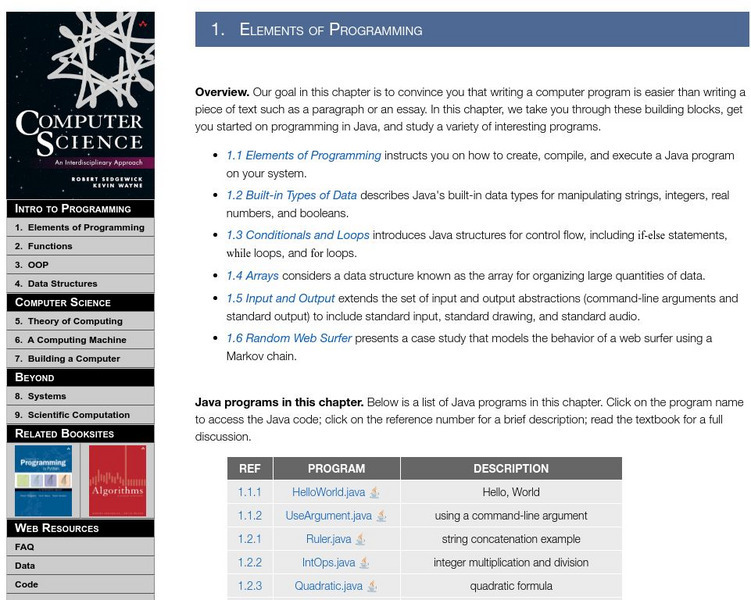Computer Science Field Guide
Computer Science Field Guide
Imagine computer science all summed up in one book. This resource provides 16 chapters that cover many aspects of computer science, ranging from algorithms to software engineering. The e-book contains links to applets to help explain...
Princeton University
Programming in Java: Elements of Programming
Writing code in java can be easier than writing a paragraph. Check out these step-by-step tutorials which show how to program in the java language.
Khan Academy
Khan Academy: Conditionals With If, Else, and Booleans
A tutorial explainning the use of if, else, and Boolean logic in computer programming.
Khan Academy
Khan Academy: Nested Conditionals
Learn how nested conditionals work in computer programming.
Khan Academy
Khan Academy: Compound Booleans With Logical Operators
Learn about computer programming using compound booleans with logical operators.
Khan Academy
Khan Academy: Number Limits, Overflow, and Roundoff
Learn about the limitations of storing numbers in computer programming.
Khan Academy
Khan Academy: Conditionals With If, Else, and Booleans
Learn how omcputer programs also make decisions, using Boolean expressions (true/false) inside conditionals (if/else).
Khan Academy
Khan Academy: Mathematical Expressions
A computer can compute results for them in a fraction of a second. Find out how we actually get the computer to do math for us?
Khan Academy
Khan Academy: Storing Data in Variables
Find out how computer programs instruct computers how to process data.
Khan Academy
Khan Academy: Random Numbers
See how we can generate random values in our computer programs, and use those to make decisions and simulate natural processes.
Khan Academy
Khan Academy: String Operations
Computer programs don't just store strings, they also manipulate them. With string operations, we can chop strings up, mash strings together, or transform strings in all sorts of ways. Learn how here.
Khan Academy
Khan Academy: Procedures With Return Values
Procedures can compute values for the rest of the program to use by sending back return values.
Khan Academy
Khan Academy: Procedures With Parameters
When programming, we use procedures to make our code more reusable and to better organize our code. Often-times, we pass parameters to a procedure so that we can change the output of the code.
Khan Academy
Khan Academy: Mathematical Procedures and Constants
With just the basic arithmetic operations, learn how to write programs to compute anything that a simple calculator can compute.
Khan Academy
Khan Academy: Conditional Repetition of Instructions
Learn how programmers repeat code using a programming construct like the while loop.
Khan Academy
Khan Academy: Nested Conditionals
Learn about when a program selects one of many paths, it can use nested or chained conditionals.
Khan Academy
Khan Academy: Numbered Repetition of Instructions
Computer programs are full of repetition, since our programs automate and simulate the world around us. Programmers use for loops to repeat a set of instructions a specific number of times.
Khan Academy
Khan Academy: Storing Strings in Variables
When we're making a program, we often want to store sequences of letters. In programming lingo, we call each letter a character and we call the sequence a string.
Khan Academy
Khan Academy: Storing and Updating Lists
Learn about storing and updating lists of data in code.
Khan Academy
Khan Academy: Iterating Over Lists With Loops
Learn how to use a loop to iterate over each element, repeating the same code for each element.
Other
W3schools: Java Methods
Learn why to use methods to reuse code: define the code once, and use it many times.
Khan Academy
Khan Academy: Compound Booleans With Logical Operators
Learn how to make shorter and more expressive code by combining simple Boolean expressions using logical operators (and, or, not) to create compound Boolean expressions.























